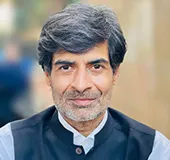 Q: Did Narendra Modi become more credible? How did his party manage to stay in power?
Q: Did Narendra Modi become more credible? How did his party manage to stay in power?
A: Prime Minister Modi contested the recent parliamentary election with at least half-a-dozen prime ministerial aspirants representing the opposition vying for his chair. That he swept the polls with the entire opposition ranged against him clearly demonstrates his credibility among the masses across regions. In sharp contrast, his opponents lacked credibility and came across as unreliable, if not unfit, for the Prime Minister's office.
The BJP alone has won 303 of the 542 seats. Its allies in the NDA won another 50, pushing the total tally to 353 seats. The Congress, the principal challenger to PM Modi and BJP, failed to win even 10 per cent of the total seats required to be designated as the main opposition party. The size and scale of 'Mandate Modi' can be imagined from the fact that over 67% of India's 900 million eligible voters participated in this election.
Although BJP is the winner in this election, Modi is the victor: it is his soaring popularity, reminiscent of the popularity of Jawaharlal Nehru and Indira Gandhi, that unleashed a massive wave of support. The BJP rode that wave to retain power. It was a single issue election. That issue was Modi. Nothing else mattered. Performance and promises of his government, including on key issues like the economy, were brushed aside along with identity politics which the Opposition had heavily relied upon to stage a comeback to the political centre-stage.
Q: Why did the recent conflict with Pakistan not affect the popularity of the Prime Minister?
A: The terrorist attack at Pulwama in Jammu & Kashmir in which a large number of security forces personnel were killed, and the subsequent retaliatory airstrikes on targets inside Pakistani territory by India, actually worked to Modi's advantage. It arguably stoked nationalist and patriotic fervour on a significant scale. Modi was seen as a leader who would not hesitate to strike back at Pakistan, unlike his predecessors who sought accommodation over anger. Usual election issues like jobs and the state of the economy were buried in the fervour of nationalism across classes and among the masses.
What was significant in PM Modi’s decision to strike Pakistan was to call the extremist state’s bluff that allowed it to believe it enjoyed immunity from conventional strikes due to its nuclear weapons. The Modi decision has opened up the conventional space to respond to terror emanating from across the border.
Q: How will Modi’s victory affect the position of the Muslim minority?
A: India's Muslims will remain secure and an integral part of what constitutes India, as will all other minority communities. In his first term Modi's government has ensured a quantum leap in the allocation of funds for minority welfare schemes that directly impact their lives, more so the millennials. By proactively seeking to protect Muslim women from discriminatory practices like “triple talaq’ Modi may have also struck a chord among them. Most of India's Muslims are integral to India's aspirational middle classes. For them, bettering their lives is most important.
PM Modi’s recent speech top his party colleagues would also have sent the message that his government is seeking to work for all Indians.
Q: How will the Russia-India relations develop?
A: The state of the relationship is robust and my assessment is that it will only get better. There will be no disruptive change in Modi's foreign policy agenda which evolved between 2014 and 2019. One of the hallmarks of this period were the deepening of ties between the two nations and the growing personal chemistry between President Putin and Prime Minister Modi.
This interview originally appeared in Valdai Club
The views expressed above belong to the author(s). ORF research and analyses now available on Telegram! Click here to access our curated content — blogs, longforms and interviews.



 Q: Did Narendra Modi become more credible? How did his party manage to stay in power?
Q: Did Narendra Modi become more credible? How did his party manage to stay in power?
 PREV
PREV


